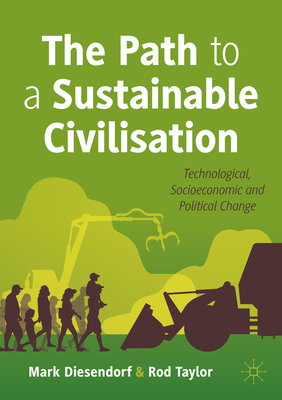“Treating the world as if we intended to stay”, to quote Crispin Tickell, neatly summarises the growing recognition that we need to respond to the threats of climate change, over-population, and unsustainable exploitation of the planets resources. Can we, as the most advanced society ever to live on earth, manufacture a ‘soft landing’ in the face of these challenges?
Authors Mark Diesendorf and Rod Taylor think so. In their hopeful book, The Path to a Sustainable Civilisation, the authors set out the challenges, dispel myths and provide a comprehensive set of policies and actions to achieve the ‘soft landing’ that they call ‘Sustainable Civilisation’
The early chapters summarize the causes of distress on our planet and human society ranging from the failure of conventional economics, overexploitation of resources and waste generation. These are relatively short chapters that don’t fully elaborate their case but make use of numerous references for those interested to go deeper. This makes for easier reading but the skeptical reader may find them presumptive and unconvincing. I don’t think this is a weakness because the book’s obvious target audience is largely those concerned enough already that they wish to take action. They hardly need a lengthy self-contained polemic to convince them there’s a problem.

One of the best chapters goes into considerable discussion on definitions and different ‘sustainable’ initiatives. This is worth careful study alone and the authors do a good job of highlighting weaknesses in apparent ‘green’ initiatives. The authors land on their own definition of Sustainable Civilisation being “…an economy with constant stocks of people and products, maintained with low levels of energy and materials throughput that are ecologically sustainable…and socially just”, and getting there will require the “planned reduction in the use of energy, materials and land, together with stabilisation of the population”. They recognize that to achieve this, the resistance of the rich and powerful must be overcome. Sound tricky? Yes, but the authors are not deterred.
The authors seek a peaceful transition to the Sustainable Civilisation without societal collapse. They see the path there is via community participation. They recognize that lobbying power-holders based on reasoned arguments alone is unlikely to succeed. Instead they advocate for two principal lines of action: building grassroots projects and creating a mass movement to change policies and practices.
This is not dissimilar to the approach advocated by author Grant Ennis. In my review of his book Dark PR, I noted that many of the actions we individually take, for example to mitigate climate change, may make us feel better but can actually be counterproductive. Ennis says the best way to effect change is by way of collective action by community members to achieve legislative change.
What Diesendorf and Taylor do in their book goes a step further. They helpfully provide a holistic and comprehensive list of what community actions and government policies are actually required to achieve a Sustainable Civilisation beyond just climate action. These are aggregated under far reaching categories ranging from reducing state capture by corporates to energy transition to reducing wars.
Yes they are challenging policies and actions. Yes, some seem almost beyond reach. But that’s why we need to start on them now.
The reviewer is a co-author of Court of the Grandchildren, a novel set in 2050s America.
Main image credit: Maruf Rahman via Pixabay

One Reply to “A Call to Action”
Comments are closed.